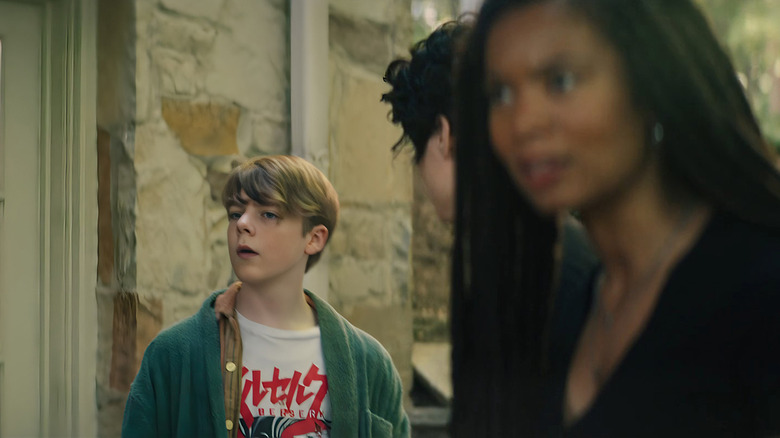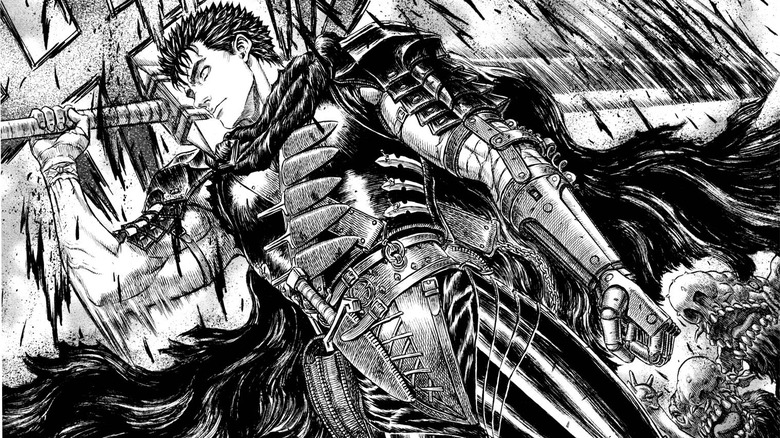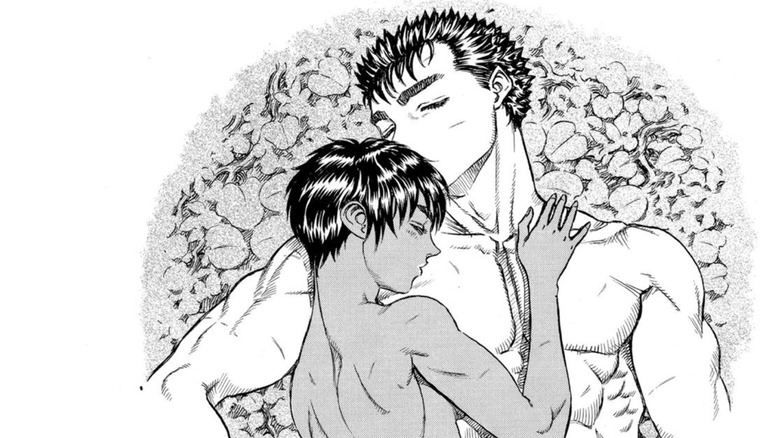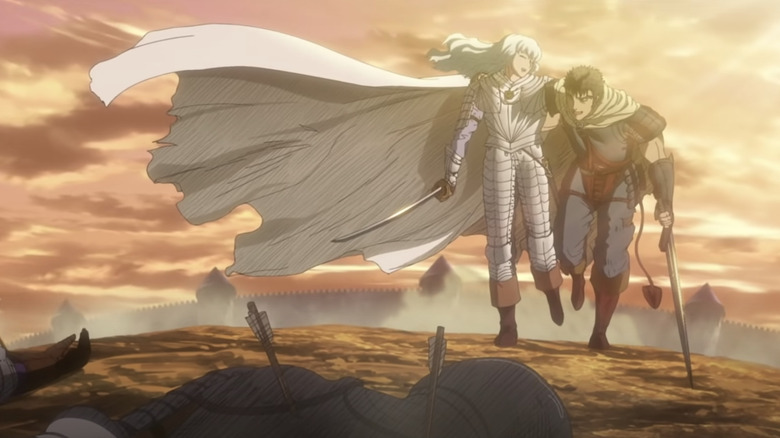An Anime Easter Egg In Gen V Hints At A Deeper Connection
This article contains spoilers for "Gen V" episode 6.
Part of the reason Prime Video's "The Boys" has been acclaimed is the ways it has adapted its source material, a satirical superhero gore-fest by Garth Ennis and Darick Robertson. The comic has its moments of pathos (e.g. Billy Butcher's dying words to Hughie in issue #71, "All that macho s***, in the end, it's f***kin' self-defeatin' [...] Men are only so much use, Hughie. Men are boys."), but it's mostly just a vile splatterfest. There's so much bad taste abound in the 72 issues that it often makes you wish your brain could spit it out.
"The Boys" TV series (developed by Eric Kripke) keeps the violence and dark humor, but it sharpens the comic's genre critique while updating it for modern politics. The superheroes of "The Boys" are still stand-ins for the rot of corporate America and celebrity culture. However, the TV show explores its characters with more sincerity (take the musical scene in episode 5). Kripke's "The Boys" doesn't laugh at its characters (at least not the leads) in the same way that Ennis' does. Thus, the same messages of toxic masculinity hit harder because you don't have to wade through as much self-indulgence.
The spin-off series "Gen V" has, thus far, worn even more of its heart on its sleeve. These "Supes" are only teenagers/college-aged young adults, so they're trying to figure out the world and themselves. Many have done terrible things (accidentally or otherwise), but they still have their souls and the show makes you root for them to keep them.
In the most recent two episodes of "Gen V," the character Dusty (Andy Walken), a party master at Godolkin U, wears a T-shirt with the logo of the dark fantasy manga "Berserk." It's a fitting invocation that transcends a mere reference.
Berserk
"Berserk," authored by the late Kentaro Miura, debuted in 1989 (Miura's assistants and his close friend Kouji Mori have taken it over since his passing). Set in a fantasy version of medieval Europe ("Midland"), the protagonist is Guts, a demon-slaying swordsman. The story has been adapted into anime several times, though each one has adapted only a chunk of the tale (thus far, anyway).
"Berserk" can be hard to stomach, but you owe yourself a read of it. The manga is renowned for its detailed artwork, with gorgeous splash pages depicting battles or crowds of terrifying demons. Miura made sure none of his monsters looked identical, but they're frequently multi-limbed and ravenous with huge maws — the better to eat you with, my dear.
If there's any other comic that outranks "The Boys" for the sheer violence, it's "Berserk." Miura's leading man isn't far off from Billy Butcher either: a hardened, vengeful man who seemingly can't escape his past.
Guts is introduced in chapter 1 having sex with a woman who turns out to be a demon (or "Apostle"). When she goes for the kill, he blows her head off with his right arm, a prosthetic housing a cannon. The first three volumes follow Guts as he wanders, besieged by the forces of darkness every night with survival as his only goal. Guts looks like a power fantasy character; one eye, a robotic arm, and a sword so huge it resembles a slab of iron. Throw in his amoral, lone-wolf persona, and you've got the perfect character for a disgruntled teenage boy who thinks the world is out to get him. Or do you?
The Bonfire of Dreams
Content warning: references to sexual assault follow.
In volume 3 of "Berserk," Guts comes face to face with the God Hand, the five Apostle leaders who exist outside normal space-time. He calls the fifth one "Griffith" and we realize this former man is Guts' object of vengeance.
Cue an extended flashback arc ("The Golden Age") until volume 14. Adopted by a mercenary band, Guts has a truly torturous childhood. In his teenage years, he joins the Band of the Hawk, led by Griffith, their brilliant and beautiful leader (glimpse his androgynous looks and long snow-white hair). Guts and Griffith are each others' first real friends, while Guts also grows close to the band's second-in-command, Casca. The two-part chapter where they consummate is titled "Wounds," with good reason.
A wound doesn't just hurt, it reveals, and in his moment with Casca, Guts is overcome with memories of a childhood assault. Sharing his most painful moment only brings the two lovers together in flesh and spirit. Outside of the narrative on the page, this scene is the sign of a maturing storyteller; Miura proves he understands the consequences of sexual violence and gains the benefit of the doubt in his depictions of it. (For a deeper breakdown of "Wounds," I'd recommend this mini-doc by "Berserk" expert Lady Emily).
Despite these bonds, the Band of the Hawk is torn apart. The culprit is something greater than foes on the battlefield: dreams.
The Struggler
Griffith has a dream to be a king, which he places above all. Through bonding with the Band of the Hawk, Guts realizes they all have their own dreams; not as ambitious as Griffith's, but dreams still. Except for him, who's only known battle. Living just to kill is no life at all, so he can only be Griffith's friend and equal with a reason to live. When Guts chooses to leave and find that reason, Griffith feels betrayed. The worst treachery is yet to come.
After being horrifically mutilated, Griffith calls forth the Godhand. They offer him a choice; sacrifice his followers and gain the power to see his dream of a kingdom through, or don't. He chooses the former with brilliant self-delusion; his dream has already taken hundreds of lives, so better to add more bodies to the pile than make those previous sacrifices for naught.
This massacre birthed the Guts who we first met. However, while the "Black Swordsman" descends into nihilism, the story still doesn't. Guts befriends new companions and relearns empathy. From there, he gradually worked to put his bloodlust (personified as an astral "Beast of Darkness") behind him. The Skull Knight, Guts' mysterious ally, calls him "the Struggler" for how he fights against forces more powerful than him. You don't struggle like that if you've succumbed to despair.
Heroes who try to do good against all odds, like Guts, include Spider-Man, Thorfinn from "Vinland Saga," Hughie from "The Boys," and the Supe kids from "Gen V." Dusty's shirt is not just a cool reference, it's a key to the heart of what makes "Gen V" great.
"Gen V" is streaming on Amazon Prime Video, with new episodes every Friday.



